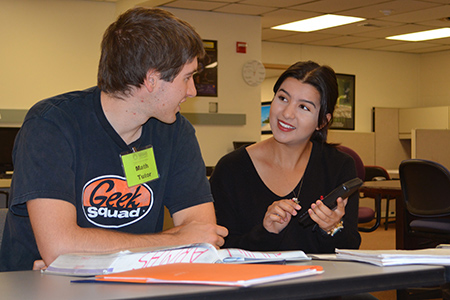
Biochemistry sophomore Karly Ortiz, right, works with ARMAS math tutor and senior math major Jacob Kelly to calculate a logarithm in the ARMAS Center. Ortiz is from Las Vegas, New Mexico and Kelly is from Ojo Feliz, New Mexico. Photo: Margaret McKinney/Highlands University
Las Vegas, NM – A New Mexico Highlands program designed to increase the number of Hispanic students earning a bachelor of science degree received recognition from the White House Initiative on Educational Excellence for Hispanics.
ARMAS, or Achieving in Research Math and Science, has helped more than 1,100 students since its start in 2009. Fifty-four percent of the students ARMAS serves are Hispanic.
“It’s gratifying that so many students have received some sort of support here,” said Edward Martinez, the ARMAS Center director. “It really goes to show our services are wanted, needed and valued by our students.
“When I was an undergraduate student, what got me through my classes was working with friends and classmates,” said Martinez, who earned his bachelor’s degree at Highlands and went on to earn his Ph.D. at Washington State University. “I wanted to create that type of atmosphere to encourage students to come in and work together.”
The White House Initiative featured AMRAS in its Bright Spots in Hispanic Education catalog released this month. ARMAS is one of 230 programs nationwide featured in the catalog and one of six New Mexico programs. The Bright Spots programs include early learning, K-12, postsecondary, and Latino teacher recruitment.
“There has been notable progress in Hispanic educational achievement, and it is due to the efforts of these Bright Spots in Hispanic Education, programs and organizations working throughout the country to help Hispanic students reach their full potential,” said Alejandra Ceja, executive director of the Initiative.
Among ARMAS’ success stories are New Mexico students Bryanna Bustos, a health major from Chimayo, who completed her doctorate in physical therapy at Regis University in Denver; Jessica de Santo, a chemistry major from Taos, who is now in pharmacy school; Sebastian Medina, a biology major from Mora, who is completing his Ph.D. at the University of New Mexico; Steven Salinas, a biology major from West Las Vegas High School, who is working on his master’s at Highlands; and Eliza Montoya, a biology major from Springer, who graduated last year and started working with the Denver Zoo at the Rio Mora Wildlife Refuge while working on her master’s at Highlands.
“We recognize that choosing to be a science math or technology major involves a lot of challenging classes that require hard work and extra time to be successful,” said Elizabeth Ratzlaff, ARMAS Center’s coordinator and data manager. “At ARMAS, we have a strong community of students who support and encourage each other to persevere and succeed. It’s a powerful dynamic.”
Martinez said a variety of students use ARMAS’ services, including students majoring in other academic fields who want to succeed in math and science classes.
“ARMAS isn’t viewed as a center for students who aren’t doing well,” Martinez said. “It’s a center for students who want to do well. You’re surrounded by a community of students who want to do well and who want you to do well.”
ARMAS provides comprehensive support services to science, math and technology students and faculty at Highlands. Science majors at the university have increased 29 percent since the program began, and students who accessed ARMAS services were 3.8 times more likely to earn degrees or remain enrolled in science, technology, engineering or math when compared to their Highlands counterparts who didn’t use ARMAS, according to a 2012 Highlands Office of Institutional Effectiveness and Research study.
“It’s our students who have really set our reputation,” said Monique Esquibel, internship coordinator for ARMAS. “You have upper-level students or students who have been here for a while wanting to give back and become mentors. It’s their experience that keeps the program going.”
